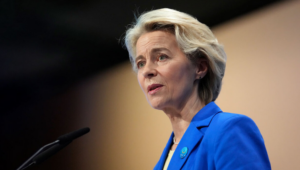This week is expected to bring significant developments in Ursula von der Leyen‘s negotiations with the leaders of EU member states regarding the next composition of the European Commission, as the bargaining for Commissioners is set to begin in earnest.
Ms. von der Leyen is returning to Brussels after a brief respite following her re-election as President of the Commission last Thursday and is expected to start her informal contacts, with Kyriakos Mitsotakis, who also acted as a negotiator for the EPP, among the first expecting a phone call. Notably, Mr. Mitsotakis supported the President of the Commission when some tried to circulate scenarios for her replacement by other means.
Ursula von der Leyen has announced significant changes in the Commission’s structure, with expectations in Brussels that the current format with executive and non-executive vice-presidents will be abolished, reverting to the older format with vice-presidents and commissioners. The Commission President has also outlined priorities for the next five years, including a portfolio focusing on Housing in addition to Defense, and a portfolio centered on the Mediterranean.
“Greece will pursue a frontline portfolio, which is important for both our country and Europe,” say government sources. An excellent portfolio would be Competitiveness, but it is likely off the table as it interests major countries. The Enlargement portfolio has resources and responsibilities, while it is considered unlikely that Greece will move toward the Agriculture portfolio, to avoid giving the impression domestically that European funds will flow with the assumption of office. Generally, Greece is not interested in newly established portfolios due to the still unclear scope of their responsibilities. However, the portfolios of Cohesion and Employment or Energy might be of interest to Greece, as they are connected with strong Directorates-General.
The Commissioner Candidate
Once the portfolio is locked in, the candidate from Kyriakos Mitsotakis’ shortlist will be revealed. Current Vice-President of the Commission Margaritis Schinas will complete his term, and a new face will move to Brussels. Mitsotakis’ decision was already made, but Schinas’ recent statements to Politico on unlocking resources for Hungary as part of a deal concerning funds for Ukraine did not help his case.
Ms. von der Leyen has requested member states to propose two candidates, one male and one female. However, several countries have only proposed one candidate, which seems to be acceptable. The most discussed candidate is the Governor of Central Macedonia, Apostolos Tzitzikostas. He has substantial European experience, having served as President of the European Committee of the Regions and an active member of the EPP. Other names mentioned include Niki Kerameus, though she recently moved to the Ministry of Labor and Mitsotakis is not fond of frequent interventions in the government structure.
Regardless of the candidate proposed by the government for a Commission portfolio, protothema.gr reports a strong possibility of Prime Minister’s diplomatic advisor Anna-Maria Boura moving to Brussels. Ms. Boura could join the team of the Commission President or lead the office of the next Greek Commissioner, as she is familiar with people and issues, having served for years in the European External Action Service (EEAS) before returning to Athens.
Following the Draghi Model
Overall, the new line of the European leadership is clear: we need to spend more on European defense, but more intelligently. This means creating a unified European defense market to avoid paying premiums for equipment from third countries, especially the USA. Additionally, von der Leyen included in her speech to the European Parliament an initiative requested by Kyriakos Mitsotakis and Donald Tusk before the European elections.
This refers to the European anti-aircraft shield, a European version of the Iron Dome that will save national resources and send a message outside the Union that the new EU five-year period will focus on strategic autonomy.
Indicative of the new Commission’s intentions was the proposal by former Estonian Prime Minister and proposed High Representative Kaja Kallas for a €100 billion defense eurobond. While the eurobond seems difficult to implement—because of German opposition—the amount is not unreasonable. For context, a few months ago, three commissioners boasted about establishing a defense fund with a scope of only €1.5 billion. Germany itself plans to increase its defense spending to €80 billion by 2028, indicating where European countries intend to move overall.
Before revealing more specific plans on allocating available or leverageable European resources, von der Leyen will listen to Mario Draghi, who was considered a potential replacement for her if leaders chose not to support her after the European elections. A year ago, the Commission tasked Draghi with preparing a report on EU competitiveness, identifying areas where the Union needs to invest more to avoid falling behind. Draghi’s findings will soon be released, aligning with the new priorities of the Union. Von der Leyen is expected to treat this report as a roadmap for the next five years, with more details to come in September.
Ask me anything
Explore related questions





